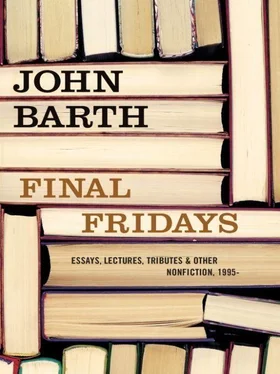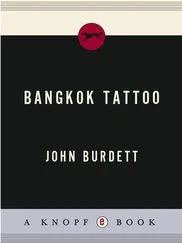—“Am I the first man to sleep with you?” “If you doze off, you will be.”
— Mouse gets pregnant in A&P; didn’t know about Safeway.
— Girdle: keeps stomach in, boys out.
— 2 old maids: 1 trying to diet, 1 dying to try it.
About one in 10 is “ethnic” or otherwise minority-directed, their targets most often African-American (always by cue only, for some reason)
— cats on fence; colored woman
— baptize darkie; last thing remembered
— canning house; sleep with darkie
but also including Native Americans ( Indian says, “Chance.” Woman: “I thought all Indians said ‘How.’” Indian: “I know how; just want chance.” ), Chinese ( Chinaman, food, flowers )[?], Scots ( Scotsman comes to U.S.; has 1st baby; wants to tell folks back home. Cablegram = 4 words for $8; he writes “Mother’s features, father’s fixtures.” ), Jews ( Jewish couple, Abe & Becky, married 50 years, in bed ), and gays ( homosexuals & hemorrhoids = queers & rears = odds & ends ). The rest tease more “neutral” targets: doctors, judges, mechanics, farmers, animals, kids and parents, mothers-in-law. Offensive as one may find those “darkie” jokes in particular — told, one presumes, prior to the Cambridge civil rights riots of the late 1960s, with its attendant sit-ins of Whitey’s Candyland (an obvious target) and other segregated businesses — it’s worth remembering that they’re an extension of the blackface minstrel, Amos ’n’ Andy tradition popular among many blacks as well as whites from the 19th century to the mid-20th, and that unlike most other Southern eateries, Whitey’s risked offending its white customers by serving blacks at least at the candy showcases and the soda fountain, as long as they didn’t presume to sit down: the aptly named “Vertical Negro” policy, easy to tsk at from this remove, but considered liberal in that place and time.
Where did all those jokes come from? Nowadays one’s e-mail is awash with them, forwarded by friends from friends of their friends: a high-speed electronic Oral Tradition. Back then, my guess is that they came from bantering exchanges with friends and customers, from vaudeville acts (even small towns like Cambridge had live vaudeville into the 1930s: touring road companies and the celebrated Adams Floating Theatre), from radio shows like the aforementioned Amos ’n’ Andy , and perhaps from the odd joke book in the Candyland’s magazine rack or paperback bookshelf. Not impossibly Dad made up a few of them himself; if so, it’s a talent that his son (like him, the younger of two) didn’t inherit. (While I’m sometimes described as a comic novelist, the only joke that I can recall ever having invented I literally dreamed up, and was surprised not only to remember upon waking but to find not unamusing: Restaurant waiter serves wine in glass with stem but no base. “How’m I supposed to set this glass down while I eat?” “Sorry, sir: We don’t serve customers who can’t hold their liquor. ” )
More to the point, what about all these jokes and joke-cues? Their most-often-fragmentary nature— prodigal son / fish heads / rabbit sausage— reminds me not only that I never got to see and hear the fellow do this particular one of the numerous things that he evidently did well indeed, but that in this as in who knows how many other ways I never got to know him: that to a greater or lesser extent our knowledge even of close kin is often fragmentary, inferred like a fossil skeleton or an ancient vase from whatever always-limited experience and shards of memory we have of them. For better as well as worse, perhaps: Just as well not to know all those “darkie” jokes, although in the context of that time and place they’d have been as inoffensively entertaining, at least to his all-white audience, as a burnt-corked Al Jolson singing “Mammy.” All the same, leafing through those time-browned, age-crisped cue sheets, like looking at his and Mother’s photographs on my bookshelves (younger then than their son is now) or his Orphans Court name plaque on the shelf above my word processor— John J. Barth, Chief Judge —inevitably makes me think, as the old Irish song laments, “Johnny, we hardly knew ye!”
Nor you me, Dad, really; nor most of us one another, finally, beyond what souvenirs we’ve been given to imagine from, and what imagination we can bring to them:
— nude sunbather on skylight over dining room
— birth control; shower / ice: 400 lbs
— Better try a different speaker next time: Even a rooster gets tired of chicken every night.
Judge John J. “Whitey” Barth, circa 1950.

A final farewell — this one for Joan Derr Barth Corkran (May 27, 1930–August 7, 2009): my twin sibling Jill. Her German middle name was the maiden surname of our paternal grandmother, Anna Derr; my own Scotch-Irish middle name (Simmons) was our maternal grandma’s married name (we kids never knew “Mommy Nora’s” husband, nor to this day do I know what her maiden name was). Our nicknames — see below — were laid on us before our official given names, John and Joan. Given the circumstance of being a twin born under the zodiacal sign of Gemini and named after a nursery rhyme, it’s to be expected that the motif of twins, doubles, alter egos, and the like may be found here and there in my fiction.
FOR THE FIRST nine months of our joint existence, my twin sister and I were womb-mates. Conceived just before the Stock Market Crash of 1929 and waiting to be born in the first dark spring of the Great Depression of the 1930s, we were blissfully unaware of everything except, I suppose, each other’s presence in that warm dark comfortable space. Even that double presence was somewhat more than our mother and her doctor were aware of in those days before ultrasound scans: Having delivered her of a healthy baby girl and thinking both his and her labors done, the doc checked out — and to all hands’ surprise, an hour and twenty minutes later an also-healthy baby boy followed, delivered by whoever happened to be on call.
Sister first, brother second: I’ll come back to that.
When the news was announced to our three-year-older brother Bill that he was no longer the family’s only child, he gamely replied, “Now we have a Jack and Jill!”—and much followed from that. Having been womb -mates, for the next ten or twelve years my twin sister and I were room mates (in twin beds, appropriately) and though less genetically close than identical twins — indeed, no closer genetically than any other pair of siblings — I’d say we were otherwise about as close as non-Siamese twins can be. From kindergarten through elementary school in Cambridge, on Maryland’s Eastern Shore, we attended the same classes, had the same friends, and were each other’s best friend. We endured plenty of teasing from classmates about the “Jack and Jill” thing (including some memorably naughty versions of the nursery rhyme), but got used to it. When we took piano lessons, our teacher inevitably assigned us duets, wherein Jill always played the upper-keyboard melody part ( Primo , considered appropriate for the girl, I guess), and Jack played Secondo , the lower-octave harmony-and-counterpoint part. Fine by me: It felt more manly down there in the bass clef.
By high school, of course, our hormones had kicked in and we’d begun to go our ever-more-separate ways: separate bedrooms, friends, and high-school curricula. But we remained in close harmony both literal and figurative. We organized a successful little jazz group, for example, called the Swingtette — Ms. Primo on piano, Mr. Secondo on drums, and a couple of our friends on sax and trombone — and played regular Saturday-night dances at the Cambridge Country Club through our junior and senior years. After graduation, however, our paths diverged indeed: Jack crossed the Bay to university, and for the next forty years returned to Cambridge and the Eastern Shore only to visit; Jill went to business school in Wilmington, returned to work in a bank in Cambridge, met and married one of her customers (Bob Corkran of nearby Hurlock), and happily went into the accounting business with him there.
Читать дальше













